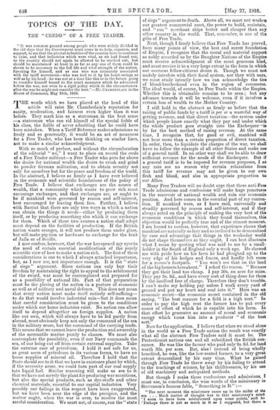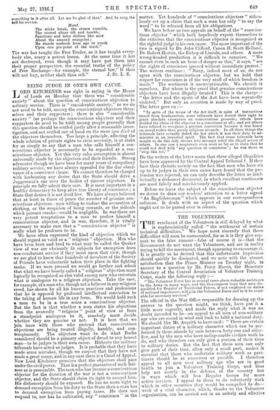TOPICS OF THE DAY.
THE " CREDO " OP A FREE TRADER.
" It was common ground among people who were widely divided in the old days that the Government must come in to help, organize, and support, to see that the pivotal industries of the country were to continue to exist, and that industries which were vital, as we had found out, to the country should not again be allowed to be crushed out, but should be maintained at least in so far as any one of them could be shown to be necessary to the full life and vital strength of the nation. Epeaking for himself, and as one who was intimately associated with the tariff movement—who was tied to it by his heart-strings as well as by his head—he was not at a time like this or in the future going to consider himself bound to the exact measures which he advocated before the war, nor oven to a rigid policy which in the circumstances after the war he might not consider the best."—Mr. CHAMBERLAIN in the Rouse of Commons, May 18th, 1916.
THE words which we have placed at the head of this article will raise Mr. Chamberlain's reputation for sanity, moderation, and fairness even higher than it was before. They mark him as a statesman in the best sense .-La statesman who can rid himself of the special foible of his class, the foible of never admitting that he could have been mistaken. When a Tariff Reformer makes admissions so freely and so generously, it would be an act of meanness for a Free Trader, who has been thinking on similar lines, not to make a similar acknowledgment.
With so much of preface, and without the circumlocution of the editorial " we," I want to place on record the credo of a Free Trader militant—a Free Trader who puts far above the desire for national wealth the desire to crush and grind to powder German militarism, and to obtain security not only for ourselves but for the peace and freedom of the world. In the abstract, I believe as firmly as I have ever believed in the economic and scientific foundations of the policy of Free Trade. I believe that exchanges are the source of wealth, that a community which wants to grow rich must encourage exchanges, and that exchanges are, or ought to be if mankind were governed by reason and self-interest, best encouraged by leaving them free. Further, I believe with Bastiat that there are only two ways in which a nation can obtain the things it needs—either by producing them itself, or by producing something else which it can exchange for them. Which of these two courses a nation shall adopt must depend on the facilities of production. If the British nation wants oranges, it will not produce them under glass, but will make pig-iron or hardware to exchange for the fruit of Jaffa or of Seville.
I now confess, however, that the war has opened my eyes to the need of certain essential modifications of the purely scientific view of how to make a nation rich. The first of these considerations is one to which I always attached importance, but, as I now see, not importance enough. It is the " state of siege " argument. Since nations can only buy their freedom by maintaining the right to appeal to the arbitrament of the sword, war must be contemplated and prepared for as a possibility of national life. Part of that preparation must be the placing of the nation in a posture of economic as well as of military and naval defence. This does not mean that every nation must make itself entirely self-sufficing- to do that would involve industrial ruin—but it does mean that careful consideration must be given to the conditions under which our home industries exist. No nation can allow itself to depend altogether on foreign supplies. A nation like our own, which will always have to be fed partly from abroad, must obviously keep not only the command of the sea in the military sense, but the command of the carrying trade. This means that we cannot leave the production and ownership of the mercantile marine purely to chance. We must also contemplate the possibility, even if our Navy commands the sea, of our being cut off from certain external supplies. Take the extreme case of petroleum. I hold it not safe for us, as great users of petroleum in its various forms, to have no home supplies of mineral oil. Therefore I hold that the State should see to it that we have in existence plant by which, if the necessity arose, we could turn part of our coal supply into liquid fuel. Similar reasoning will make us see to it that we have not merely the plant for producing war munitions, but also the special products, such as dye-stuffs and other chemical materials, essential to our capital industries. Very possibly our failings in this respect have been exaggerated, but we have been near the edge of the precipice, and the matter ought, when the war is over, to receive the most careful consideration. We must not, of course, run the " state of siege" argument to death. Above all, we must not weaken our greatest commercial asset, the power to build, maintain, and " run " merchant ships better and cheaper than any other country in the world. That, remember, is one of the gifts of Free Trade.
Next, though I firmly believe that Free Trade has proved, from many points of view, the best and surest foundation of Empire, I recognize that the moral and material support so nobly accorded us by the Daughter Nations of the Empire must receive acknowledgment of the most generous kind, and must receive it to a very large extent in the form in which our overseas fellow-citizens desire it. Though we must not unduly interfere with their fiscal system, nor they with ours, we must study intently how we can acknowledge the ties of blood-brotherhood even in the region of commerce. The ideal would, of course, be Free Trade within the Empire. Whether this is obtainable remains to be seen ; but any advance towards it will be welcome, even if it involves a certain loss of wealth to the Mother Country.
I still hold in the abstract as firmly as before that the raising of public funds by a tariff is per se a wasteful way of getting revenue, and that direct taxation—the system under which people know exactly what they pay and under which the whole product goes straight into the Exchequer —is by far the best method of raising revenue. At the same time, I recognize that, for good or evil, mankind will not bear more than a certain proportion of direct taxation. In order, then, to liquidate the charges of the war, we shall have to follow the example of all other States and make use of a general tariff. In no other way shall we be able to draw sufficient revenue for the needs of the Exchequer. But if a general tariff is to be imposed for revenue purposes, I at any rate see no reason why certain relaxations from this tariff for revenue may not be given to our own flesh and blood, and also in appropriate proportion to our Allies.
Many Free Traders will no doubt urge that these anti-Free Trade admissions and confessions will make huge punctures in the reservoir of national wealth and ruin our economio position. And here comes in the essential part of my conten- tion. If mankind were, as I have said, universally and steadily governed by reason and self-interest, and if they always acted on the principle of making the very best of the economic conditions in which they found themselves, this objection would be perfectly true and of the utmost moment. I am bound to confess, however, that experience shows that mankind are naturally so lazy and so inclined to be demoralized by ease and advantage that things in the workaday world do not shape themselves as they ought. I can best illustrate what I mean by quoting what was said to me by a small- holder in the South of England only a week ago. He showed me with pride how on his farm he had ploughed up to the very edge of his hedges and fences, and hardly left room for a mouse's footpath. " You won't see that on the land of the big farmers hereabout." I asked the reason. " Because they get their land too cheap. I pay 30s. an acre for mine. They pay 9s. 6d., and have every sort of thing done for them by the landlord free of charge. Therefore they don't trouble. I can't make my holding pay unless I work every yard of ground and put my heart and soul into it." Here was an economic secret—the economic secret contained in the old saying, " The best manure for a field is a high rent." In order to pay the high rent the farmer has to put every ounce of effort of which he is capable into his farm. In that effort he generates an amount of moral and economic energy which turns him into a producer " of the best sort."
Now for the application. I believe that when we stood alone in the world as a Free Trade nation the result was exactly what all the abstract Free Traders said it must be. The Protectionist nations one and all subsidized the British con- sumer. He was like the farmer who paid only 9s. 6d. for land worth 30s. per acre. But, alas l instead of being wholly benefited, he was, like the low-rented farmer, to a very great extent demoralized by his easy time. What he gained through Free Trade he threw away by his failing to attend to the teachings of science, by his thriftlessness, by his use of old machinery and antiquated methods. But though I make these confessions and admissions, I must use, in conclusion, the wise words of the missionary in Stevenson's famous fable, " Something in It " :— " The next moment the missionary came up in the midst of the. sea . . . Much matter of thought was in that missionary's mind. I seem to have been misinformed upon some points, said he ' Perhaps there is not as much in it as I supposed, but there it
something in it after all. Let me be glad of that.' And he rang the bell for service.
Moral.
Tho sticks break, the stones crumble, The eternal altars tilt and tumble, Sanctions and tales dislimn like mist About the amazed evangelist ; He stands unshook from age to youth Upon one pin-point of the truth."
The war has taught the Free Trader, as it has taught every- body else, many a potent lesson. At the same time it has not destroyed, even though it may have put them into their proper perspective, the essential truths of the policy of Free Exchange—for example, the eternal law," If thou wilt not buy, neither shalt thou sell." J. ST. L. S.































 Previous page
Previous page